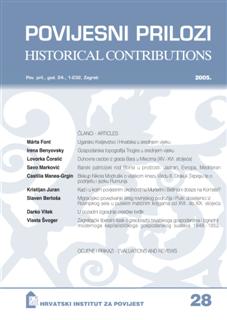Barski patricijski rod Borisi u prošlosti: Jadran, Evropa, Mediteran
The patrician family Borisi of Bar in the past: Adriatic, Europe, Mediterranean
Author(s): Savo D. MarkovićSubject(s): History
Published by: Hrvatski institut za povijest
Keywords: Bar; patriciate; Middle Ages; Istria; Venetian Republic; New Age; cultural history
Summary/Abstract: Members of the Boris/Borisi family can be traced since the 14th century through their family, economic and proprietary relations, their social and public roles, and especially in art and spiritual life, based on archival and historiographic sources, in the details of the micro world of medieval, Early Modern and modern eras dispersed in time and space, but at the same time existing in the Euro-Mediterranean span. Their influence in town administrative and communal affairs grew with their economic strengthening, which is evident in both, their connections with medieval magnates and the direct address of Pope Sixtus IV to the priest Peter Boris. Their land, social reputation and relations, important ecclesiastic positions and political power secured them the attribute of prominent feudalists. The priorities of the Borisi family changed with the political instability. By reducing the autonomy of littoral towns, the Venetian Republic abolished the town communes’ rights of autonomous administration, independent decision-making in regards to their class, and consequently, minimized the significance of aristocracy as a political factor. The Borisi family withdrew from the public sphere of the central urban sector and turned towards the intermediary trade on the Mediterranean. The town’s fall under the Turkish rule has been soon followed by their emigration from Bar to Dubrovnik and Istria. The Borisi, soldiers and diplomats in the service of Serenissima, as well as Transylvania, Wallachia and Moldova in certain denominations, were abundantly rewarded in estates, especially with Funtana near Vrsar in Poreč region, which they occupied from the beginning of the 17th century until 1864. Although far away, the Borisi generation in the first century after the emigration from Bar to Istria remembered their homeland, helped and welcomed their former colonials and their descendants, preserving the memories of historic traditions of their hometown in the inscription above the doorway of the Funtana castle which serves as the testimony of their spirit, sense and resilience. The modern era has offered new possibilities for interpreting the influence of the Borisi family, especially in political and cultural spheres, which, always proud of their family tradition, privileges and history, have continued to distinguish themselves in the social makeup of the crossways of Istria and Venice.
Journal: Povijesni prilozi
- Issue Year: 2005
- Issue No: 28
- Page Range: 71-105
- Page Count: 35
- Language: Croatian

